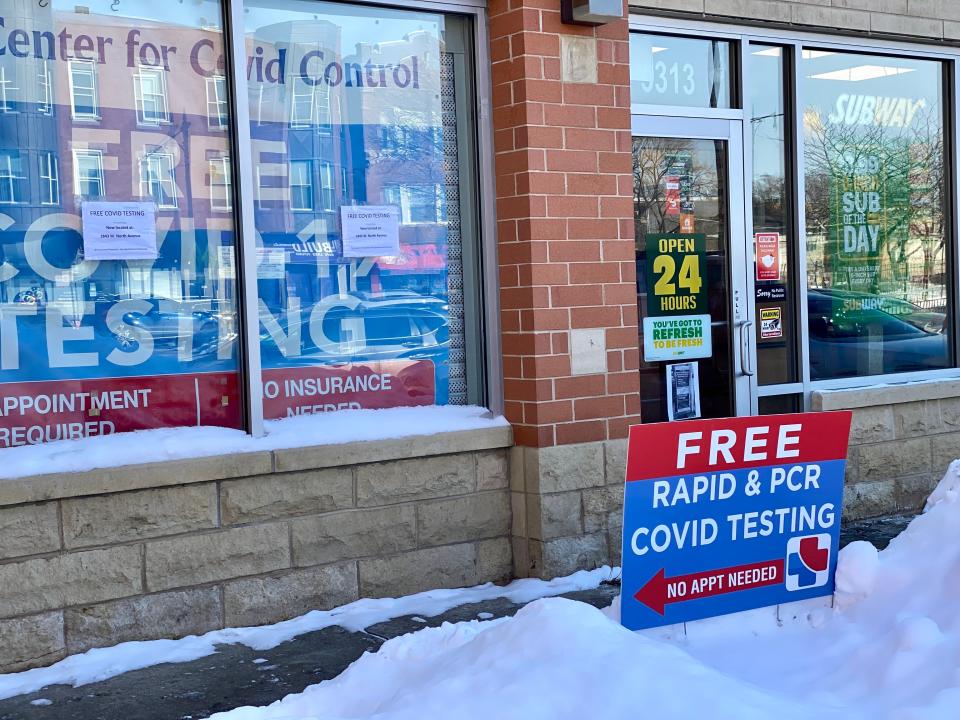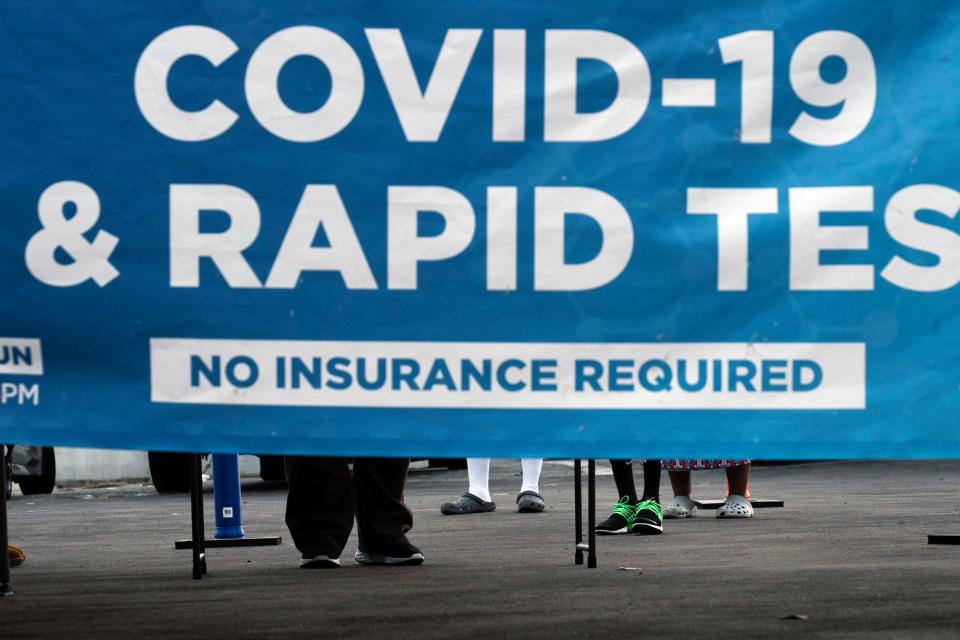As lab owners buy luxury cars, Biden tightens oversight of $5 trillion in COVID-19 relief
When patients came to the South Florida testing lab owned by Christopher Licata, they got the COVID-19 tests they requested — plus more lucrative but medically unnecessary genetic and respiratory tests, allowing Licata to bill $6.9 million to Medicare, federal prosecutors say.
Licata got caught — the Delray Beach man pleaded guilty to one count of conspiracy to defraud Medicare and is scheduled to be sentenced March 24 — but federal officials are scrambling to tighten oversight of more than $5 trillion in pandemic relief funding passed by Congress over the past two years.
President Joe Biden highlighted the enormous challenge this week in his State of the Union address when he announced plans for a special prosecutor to “go after the criminals who stole billions of relief money.”
While the White House cited as examples identity theft by criminal syndicates and widespread fraud of pandemic relief programs for small businesses and unemployed workers, experts say programs that have shelled out billions on COVID-19 testing and medical care also have been subject to fraud and misspending.
The federal government has paid more than $10 billion to schools, community health centers, labs, doctors, telemedicine companies and entrepreneurs to provide COVID-19 testing and related services. Only a handful of lab owners and testing providers have been accused of wrongdoing and charged with crimes.
But there are signs of burgeoning problems.
The federal government has paid more than $500 million to three labs with ties to a handful of nationwide testing operations now under investigation. In January, the FBI searched the headquarters of one testing marketer, the Center for COVID Control in the Chicago area, headed by an entrepreneur whose social media posts cited "COVID money" with images of new Lamborghinis, a Ferrari and a $1.36 million mansion.

Government oversight investigators have warned coronavirus tests can lead to fraud when labs or doctors use them to order more expensive but unnecessary tests to enrich themselves. The U.S. Department of Health and Human Services' inspector general will analyze Medicare claims submitted by labs for respiratory, allergy and genetic tests to find patterns of fraud and abuse. The report is due this year.
Licata, 45, who owned Boca Toxicology, bribed at least two people who recruited Medicare patients and obtained doctors' orders for COVID tests and "higher reimbursing" respiratory and genetic tests, according to his plea deal. Licata arranged kickbacks to telemedicine companies to obtain doctors' orders for unnecessary respiratory and genetic tests, court documents state.
In November, an Arkansas man was indicted on health care fraud charges in connection with $100 million in false billings for urine drug, COVID-19, respiratory and other tests. Federal prosecutors said Billy Joe Taylor, who controlled several labs, obtained information of Medicare enrollees and repeatedly submitted claims for tests. Federal prosecutors said he used the money to live a "lavish" lifestyle. Among the items seized by federal prosecutors: a Rolls Royce, Tesla and a Porsche, real estate, jewelry, dozens of guitars and other instruments, clothes and other items.
The federal government already has assigned an oversight group of 21 inspectors general called the Pandemic Response Accountability Committee. The oversight group created a website to track public spending and provide data to analyze trends to detect fraud, waste and abuse.
But experts say such large amounts of public money designed to be spent quickly will inevitably attract people looking to exploit the public health crisis.
"You're going to lose money along the way," said Bruce Dorris, president and chief executive officer for the Association of Certified Fraud Examiners. "The fraudsters are taking advantage of this massive amount of money being flooded into a marketplace so quickly, with very little safeguards."
'Oversight really suffered'
When the Trump administration pushed through the first pandemic relief programs in 2020, a basic compromise was made. Confronted with mounting infections, deaths and shutdowns to slow the spread of coronavirus, Congress passed a series of relief packages to get aid to Americans as quickly as possible.
“They made it clear speed was the priority, and because of that the oversight really suffered,” said Sean Moulton, senior policy analyst at Project on Government Oversight.
The Justice Department has prosecuted dozens of cases involving fraud and theft from the Paycheck Protection Program, which advances loans to businesses that can be forgiven if businesses use the funds correctly and document jobs saved. Unemployment insurance benefits also have been targeted by fraudulent claims. Biden's new special prosecutor will lead teams of prosecutors and agents to pursue cases involving such fraud, according to White House officials.
Government investigators can attempt to recoup money in the event of criminal fraud or if money is spent outside the parameters of a program. But in many cases, it’s difficult to recoup money that might be frittered away.
“Money went out the door with very little checks and balances ahead of time," Moulton said. “And then there was this effort to conduct oversight investigations afterwards, which is far from the most efficient way to do this to try and get this money back."
Uninsured program draws attention
While Medicare and Medicaid have established ties to doctors and labs, the Health Resources Service Administration’s COVID-19 Uninsured Program is new and set up to quickly reimburse for testing, administering vaccines and other COVID-related care. Congress has authorized more than $4 billion to the program.
Since the beginning of the pandemic, federal prosecutors have brought a half dozen criminal cases against individuals accused of misspending Medicare funds on coronavirus testing schemes, according to the federal government's pandemic oversight website. Nobody has been charged for misusing funds from the uninsured program.
Nearly 50,000 labs, doctors and other providers have been reimbursed by the uninsured program, according to a federal payments database.

The agency takes “corrective action” against providers who don’t comply with terms and conditions of the uninsured program. Those actions can include withholding reimbursement, post-payment reviews and termination from the program, said HRSA spokesman Scott Kodish.
The agency also vets doctors and labs to ensure they have not been terminated from participating in Medicare, Medicaid or other health programs. The HHS Inspector General publishes a monthly list of providers that are excluded from these federal health programs.
HRSA representatives declined to identify any examples of providers who have been ousted from the uninsured program. “HRSA has taken corrective actions towards participants in the uninsured program, including placing funds on hold,” Kodish said. “However, as mentioned, we cannot comment on specific cases or provide details on these actions.”
The HHS Inspector General is conducting an audit of the uninsured program to verify whether claims for COVID-19 testing or treatment meet federal requirements. The review is scheduled to be completed this year, a spokeswoman said.
Two states sued the nationwide coronavirus testing chain Center for COVID Control and its primary lab, Doctors Clinical Lab, alleging the sites and lab provided inaccurate results, fraudulently reported negative results and listed people with private insurance as uninsured.
Even after Minnesota and Washington sued the testing chain and lab, Doctors Clinical Lab continued to collect from the uninsured program. From Jan. 31 through Feb. 22, Doctors Clinical Lab's locations in Chicago and Rolling Meadows, Illinois, were paid $11.4 million for COVID testing.
Fraud experts say while some cases are prosecuted criminally, many labs might not run afoul of the law but still spend public dollars in a way that provides little benefit.
“Maybe they didn't break the law, but they probably didn't need the money, or they took the money to provide certain services that they weren't really capable of doing,” Moulton said. “It’s really hard to say it was outright fraud. But a little checking ahead of time might have revealed this is not the company we should be doing COVID testing through. They have no experience in this area.”
Grace Hauck contributed.
Ken Alltucker is on Twitter as @kalltucker or can be emailed at alltuck@usatoday.com.
This article originally appeared on USA TODAY: COVID-19 relief funds getting new federal scrutiny to root out fraud

